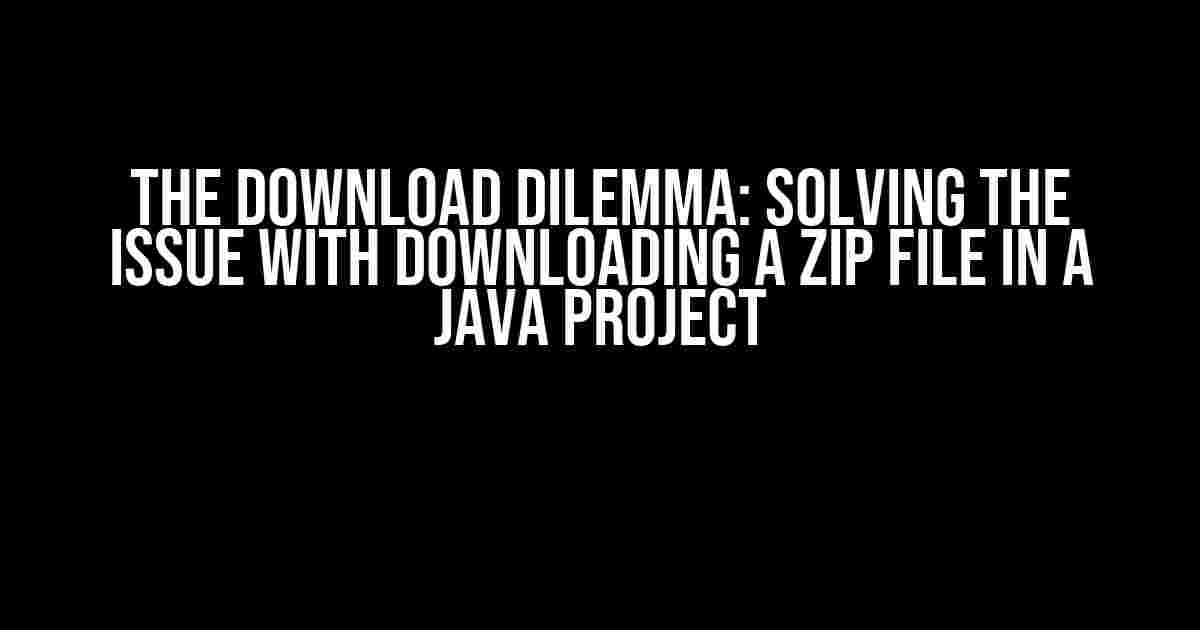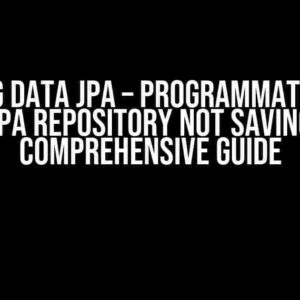Are you stuck in a rut, trying to figure out why your Java project won’t download a ZIP file? Well, buckle up, friend, because we’re about to dive into the world of coding conundrums and emerge victorious on the other side!
The Problem: A Brief Overview
Before we dive into the solution, let’s take a step back and understand the problem. You’ve got a Java project that needs to download a ZIP file from a remote location. Sounds simple, right? Yet, when you run the code, the ZIP file refuses to download, leaving you with a bunch of frustrated errors and a severe case of hair-pulling syndrome. Don’t worry, we’ve all been there!
Cause of the Issue: A Checklist
Before we get to the solution, let’s quickly go over some common causes of this issue:
- Improperly configured URL or file path
- Incorrect file permissions or access rights
- Network connection issues or connectivity problems
- Invalid or corrupted ZIP file
- Java code errors or exceptions
Take a deep breath, and let’s tackle each of these potential culprits one by one!
The Solution: Step-by-Step Instructions
Follow these steps to download a ZIP file in your Java project:
-
Step 1: Import the Required Libraries
In your Java project, make sure to import the following libraries:
import java.io.BufferedInputStream;
import java.io.FileOutputStream;
import java.io.IOException;
import java.net.URL; -
Step 2: Specify the URL and File Path
Next, specify the URL of the ZIP file you want to download and the local file path where you want to save it:
URL url = new URL("https://example.com/path/to/zipfile.zip");
String filePath = "C:\\LocalPath\\zipfile.zip"; -
Step 3: Create a Buffered Input Stream
Create a buffered input stream to read the ZIP file from the URL:
BufferedInputStream bis = new BufferedInputStream(url.openStream()); -
Step 4: Create a File Output Stream
Create a file output stream to write the ZIP file to the local file path:
FileOutputStream fos = new FileOutputStream(filePath); -
Step 5: Download the ZIP File
Use the buffered input stream to read the ZIP file and write it to the file output stream:
byte[] buffer = new byte[1024];
int len;
while ((len = bis.read(buffer)) != -1) {
fos.write(buffer, 0, len);
} -
Step 6: Close the Streams
Finally, close the buffered input stream and file output stream:
bis.close();
fos.close();
Error Handling and Best Practices
Remember, error handling is crucial when dealing with file downloads. Make sure to wrap your code in a try-catch block to handle any exceptions that might occur:
try {
// Your code goes here
} catch (IOException e) {
System.out.println("Error downloading ZIP file: " + e.getMessage());
} finally {
// Close the streams in the finally block
bis.close();
fos.close();
}
Additionally, consider the following best practices:
- Use a decent IDE with code completion and debugging tools to help you identify errors.
- Test your code regularly to catch any issues early on.
- Use a consistent naming convention and organize your code logically.
- Comment your code to make it easier for others (and yourself) to understand.
Troubleshooting Common Issues
If you’re still facing issues, try these troubleshooting steps:
| Error Message | Possible Cause | Solution |
|---|---|---|
| ConnectException: Connection refused | Network connection issues | Check your network connection and ensure that the URL is correct. |
| FileNotFoundException | Invalid file path or permission issues | Verify the file path and ensure that the Java application has the necessary permissions to write to the file location. |
| IOException: Stream closed | Streams not closed properly | Make sure to close the streams in the finally block to avoid this issue. |
Conclusion
There you have it, folks! With these step-by-step instructions and troubleshooting tips, you should be able to download a ZIP file in your Java project without any hiccups. Remember to stay calm, patient, and methodical in your approach to debugging, and don’t hesitate to seek help when needed.
Lastly, don’t forget to celebrate your victory with a well-deserved cup of coffee (or two, or three…). You’ve earned it!
Happy coding, and may the download be with you!
Frequently Asked Question
Stuck with downloading a zip file in your Java project? Don’t worry, we’ve got you covered!
Why is my Java program unable to download a zip file?
This could be due to several reasons, including incorrect URL, insufficient permissions, or even a simple typo in the file path. Make sure to check the URL, file path, and permissions before attempting to download the zip file.
What are the common HTTP status codes that may indicate an issue with downloading a zip file?
HTTP status codes 404 (Not Found), 403 (Forbidden), 401 (Unauthorized), and 500 (Internal Server Error) may indicate issues with downloading a zip file. Check your server logs to identify the exact error code and resolve the issue accordingly.
How can I handle exceptions while downloading a zip file in Java?
You can handle exceptions using try-catch blocks, specifically catching exceptions like IOException, MalformedURLException, and FileNotFoundException. This allows you to provide a meaningful error message to the user and take necessary actions to resolve the issue.
What are some popular Java libraries for downloading files, including zip files?
Apache Commons IO, OkHttp, and Unirest are popular Java libraries for downloading files, including zip files. These libraries provide efficient and flexible ways to handle file downloads, including error handling and progress tracking.
Can I use Java 8’s built-in features to download a zip file?
Yes, Java 8 provides features like java.nio.file.Files and java.net.URLConnection to download files, including zip files. You can use these features to create a simple and efficient file downloader without relying on external libraries.




